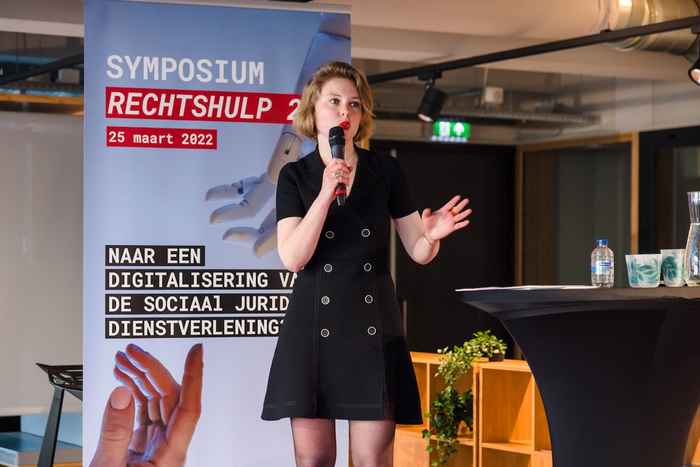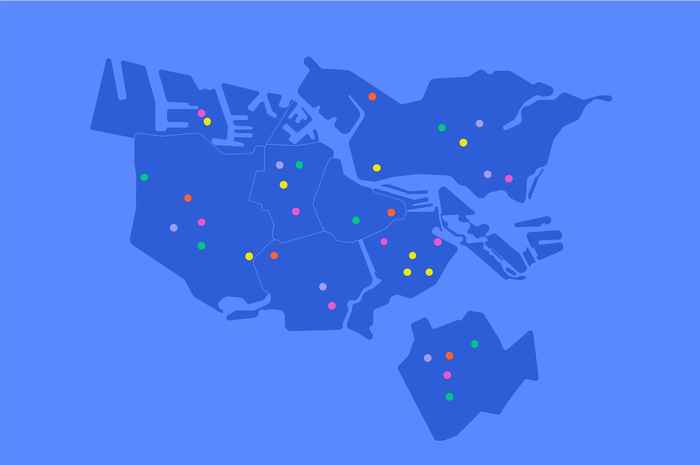Symposium Legal Aid 2.0: ''Techno-optimism with critical remarks''.
#INNOVATION
5 April 2022

From the discussions with the audience and the speakers, another clear question kept coming up: for whom do you develop a tool, for the citizen or for the legal professional? Looking at the social advocacy sector, it seems that the sector is ready for digitalisation, but lacks the right tools for it. The commercial lawyers are willing to prepare the social lawyers for it - in whatever way they can. Yet in practice, this seems more difficult than expected. As does technology for the citizen. Professor Hazel Genn opened the Symposium with a statement that still stands at the end: 'You can be optimistic, but at the same time you have to remain critical because there are also many groups that do not benefit from technology'. There is room for techno-optimism but with critical remarks. The research report also revealed that citizens do not appear to be as self-reliant as the government believes. A significant proportion of those seeking justice have difficulty with language and digital skills. It is therefore important to tackle the problem at the front end by writing letters and documents in layman's terms and making procedures less complicated. In addition, the importance of (personally) involved assistance is evident.

In addition, it became clear that the role of the legal aid clinics has certainly not finished. They play an important role in first-line legal aid provision and help an estimated 25,000-30,000 citizens per year. Legal aid clinics appear to be close to the citizen: most legal aid clinics hold their consulting hours in the neighbourhood or at another easily accessible location, usually more than once a week. Moreover, there are no income requirements for legal aid and advice is almost always free of charge.
In the press
Our symposium and research report has been shared by journalists and colleagues from the legal sector. We've selected some of these content:
Opinion Folkert Jensma in NRC
Legal commentator Folkert Jensma (NRC), who closed the afternoon with a striking summary, wrote an opinion entitled ''Rechtspraak in de Kast' kan kloof met de burger ook vergroten". He concludes that the United Kingdom is much further ahead with digital justice than the Netherlands. Read his opinion.
Contribution Mark van Dorp (LinkedIn)
On LinkedIn, Mark van Dorp also looks back on the Symposium. He is the founder of Adapting, which aims to simplify legal processes and thus improve access to legal services.
He sums up his lessons learned, because as a technology entrepreneur the Symposium offered him very valuable input for the further development of AdaptingLegal. "Thanks to institutions like the Amsterdam Law Hub, the digitisation of social legal services is going in the right direction. Awareness is growing and different disciplines are talking to each other. Apart from that, there is still a lot to do." He sees the challenge of helping social legal services to use technology effectively. "And that's not just about a tool that may or may not be useful. It's about the complete picture where the legal aid seeker is central and legal aid is made easily accessible to everyone through digitisation." Read his full contribution here.
Blog Jelle van Veenen (Kennedy Van der Laan)
Jelle van Veenen, Innovation Manager at Kennedy Van der Laan & co-founder of Dutch Legal Tech, wrote a short blog on the occasion of the Symposium. Can you (as a lawyer) just rely on technology?
What struck him was the distrust of technology in the legal sector. This may be justified (technology in itself does not solve anything, and can certainly make problems worse), but in the discussion about this he often misses the scientific basis. How do we really find out what does work, and under what conditions? Read his blog here.